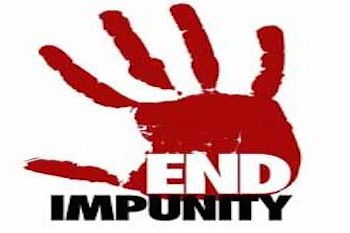2 November 2019 – Today, on the sixth United Nations (UN) International Day to End Impunity for Crimes against Journalists, Americans for Democracy & Human Rights in Bahrain (ADHRB) condemns the attacks on journalists, bloggers, writers, and human rights defenders in Bahrain and the broader Gulf and calls upon these countries to take serious steps to hold perpetrators accountable for their crimes.
Earlier this year, Bahraini photojournalist and activist Moosa Mohammed scaled the Bahraini Embassy in London in protest of the impending executions of torture victims Ali AlArab and Ahmed AlMalali. He was approached by staff members of the Embassy and alleges that the Bahraini officials began to beat him with a wooden stick as he straddled the ledge of the building, and that they were pushing him and threatening to throw him off the building. He was then dragged off the ledge where he disappeared from the view of individuals watching below. In response to concerns for photojournalist Moosa’s life, police and fire forces eventually forced entry to the Bahraini Embassy and retrieved Moosa.
Protesters shouted that the Bahraini government was going to kill Moosa like Khashoggi – referencing the journalist who was murdered in a Saudi consulate in Istanbul in 2018. A year later, there still has not been full accountability for the death of Khashoggi. Agnes Callamard, the UN Special Rapporteur for extrajudicial, summary or arbitrary executions, issued a report further implicating Saudi Crown Prince Mohammed bin Salman (MbS) in orchestrating the murder, but he has not come close to being prosecuted for his involvement.
Bahrain – like Saudi Arabia – has a history of targeting journalists with impunity. In 2012, Bahraini security forces shot and killed photojournalist Ahmed Ismail Hassan while he was attending a protest against the Formula One Grand Prix in Bahrain. The UN called for an investigation of Ahmed Ismail’s death, but according to a 2016 UN Educational, Scientific and Cultural Organization report, the case is unresolved and the perpetrators remain at large. Additionally, in 2011, Bahrain’s National Security Agency (NSA) detained Karim Fakhrawi, cofounder of the now-closed independent newspaper Al-Wasat, and tortured him to death.
The culture of impunity in Bahrain extends to the highest levels of the government, including with Sheikh Nasser bin Hamad Al Khalifa, son of Bahrain’s king and known in the human rights community as the “Torture Prince.” Following the government’s violent suppression of the 2011 pro-democracy movement, credible evidence emerged that Sheikh Nasser directed the arbitrary detention and torture of protesters, opposition activists, and athletes. In his capacity as the head of Bahrain’s Olympic Committee, Sheikh Nasser created a special commission to identify and punish more than 150 members of the sporting community who had peacefully demonstrated.
Two opposition leaders and members of the Bahrain 13 – a set of prominent prisoners of conscience initially imprisoned by military courts in 2011 – have also reported that Sheikh Nasser personally tortured them at the Ministry of Interior’s facilities. Opposition figures, including Mohammed Habib al-Miqdad, accuse the prince of flogging and beating them all over their bodies for nearly 12 hours, among other abuses. In 2014, the High Court of London even ruled to overturn Sheikh Nasser’s royal immunity after a Bahraini refugee under the name “FF” brought a case against him in the UK. Like al-Miqdad, FF alleges that Sheikh Nasser was involved in torture.
Despite the excess of allegations against Sheikh Nasser, he has regularly been appointed to esteemed positions throughout the Bahraini government and has not been investigated or held accountable for his role in perpetrating abuse. In 2017, Sheikh Nasser was appointed to serve as a member of the Supreme Defense Council (SDC), which is considered to be the country’s highest defense authority and presides over major national security decisions. Most recently, Sheikh Nasser was appointed as National Security Advisor earlier this month – a position that further oversees the national security policies and strategies of Bahrain.
“Bahrain is continuing on a path of severe repression, stifling dissent, arresting and torturing dissidents, and threatening and imprisoning journalists. Severe human rights violations like torture will remain as long as the perpetrators are able to operate with impunity. We cannot let countries continue to sanction such gross violations of human rights,” said ADHRB’s Executive Director Husain Abdulla. “We call upon the international community to hold Bahrain accountable for its crimes against journalists and human rights defenders and to pressure the government to investigate rights abuses and acts of violence and to hold the perpetrators accountable.”
On International Day to End Impunity for Crimes against Journalists ADHRB condemns the violence the Bahraini and Saudi Arabian governments have applied against journalists and activists. We urge the governments to investigate all allegations of human rights violations and to hold identified perpetrators accountable, with a view towards ending the culture of impunity.





